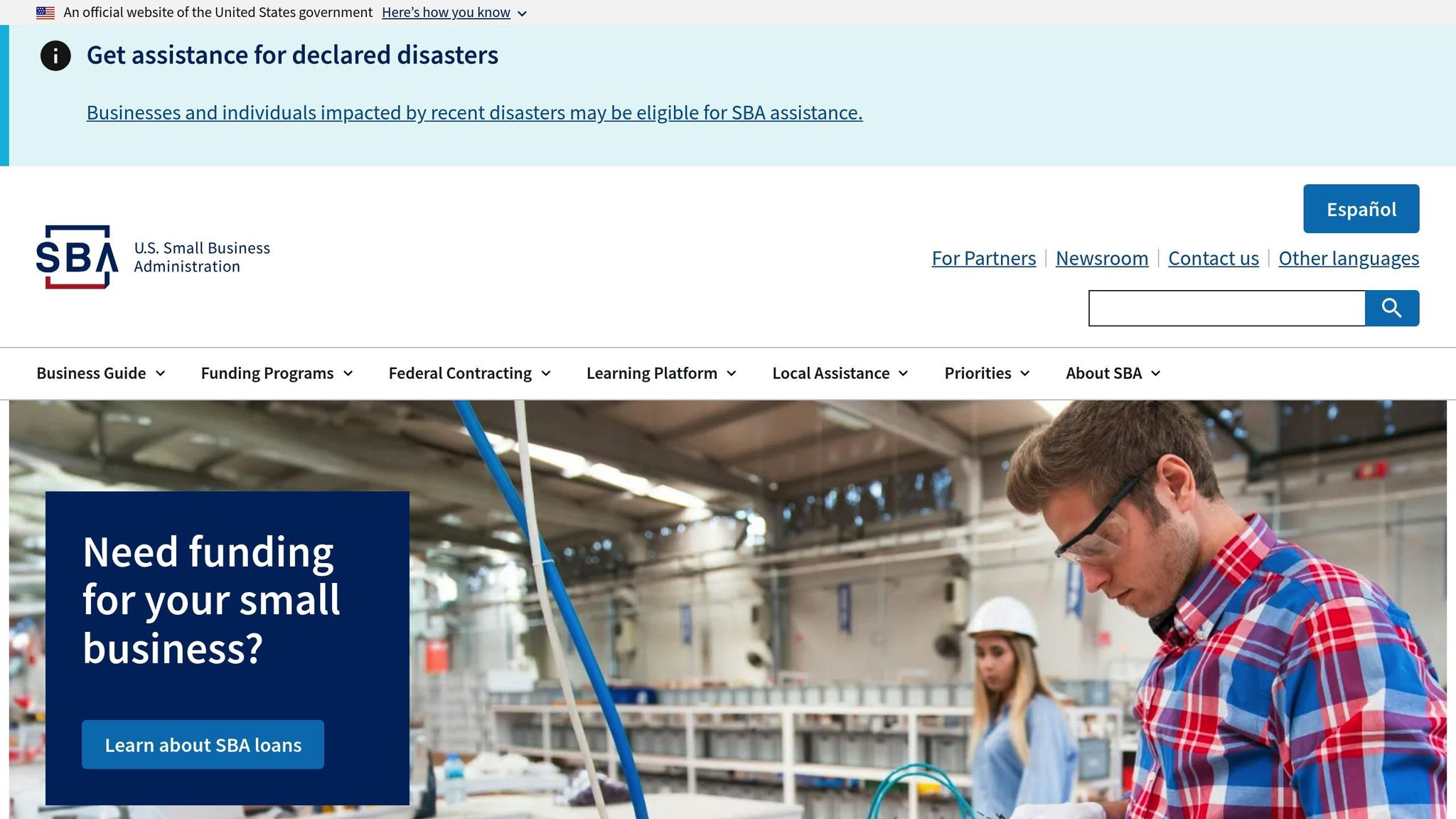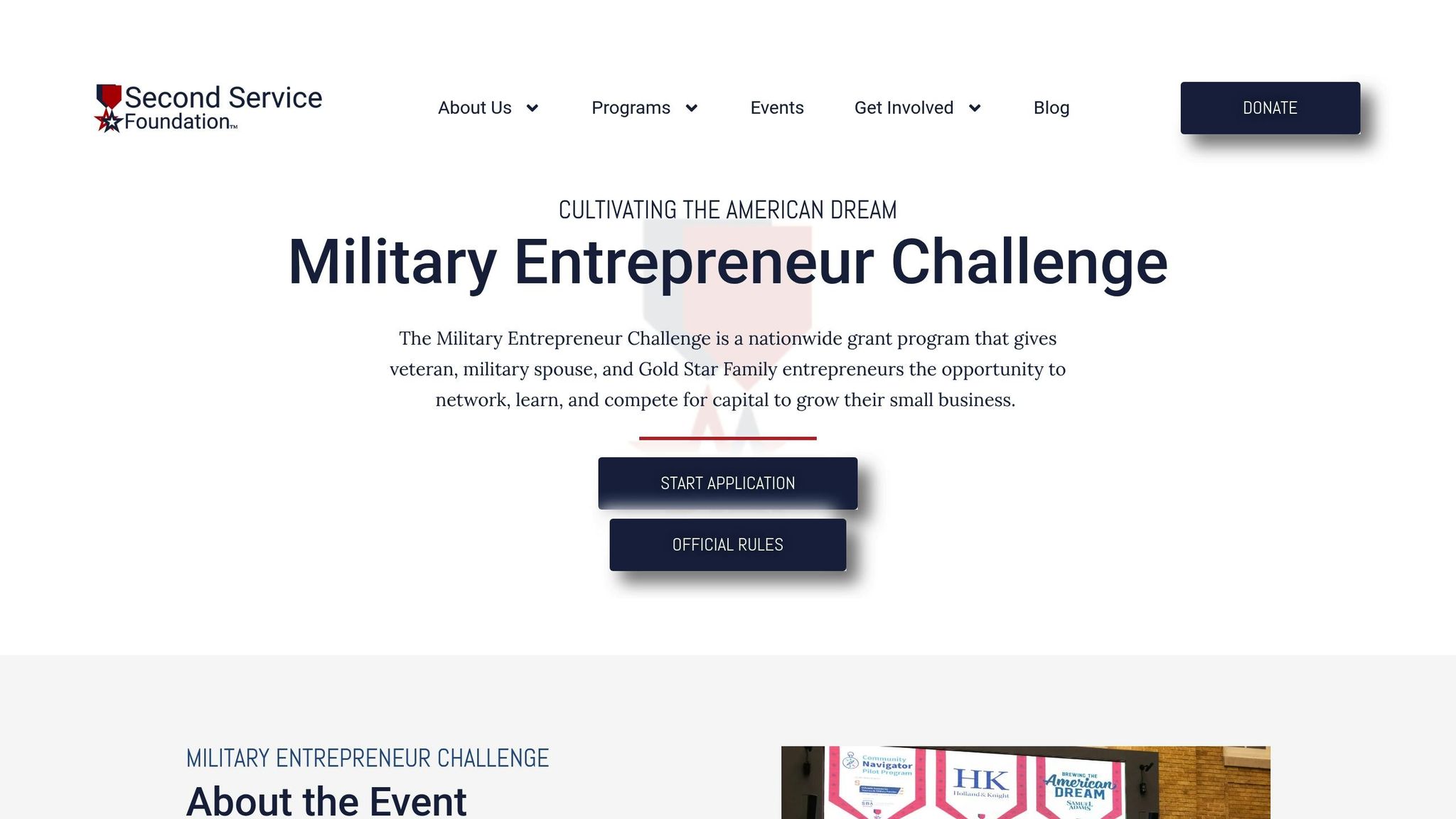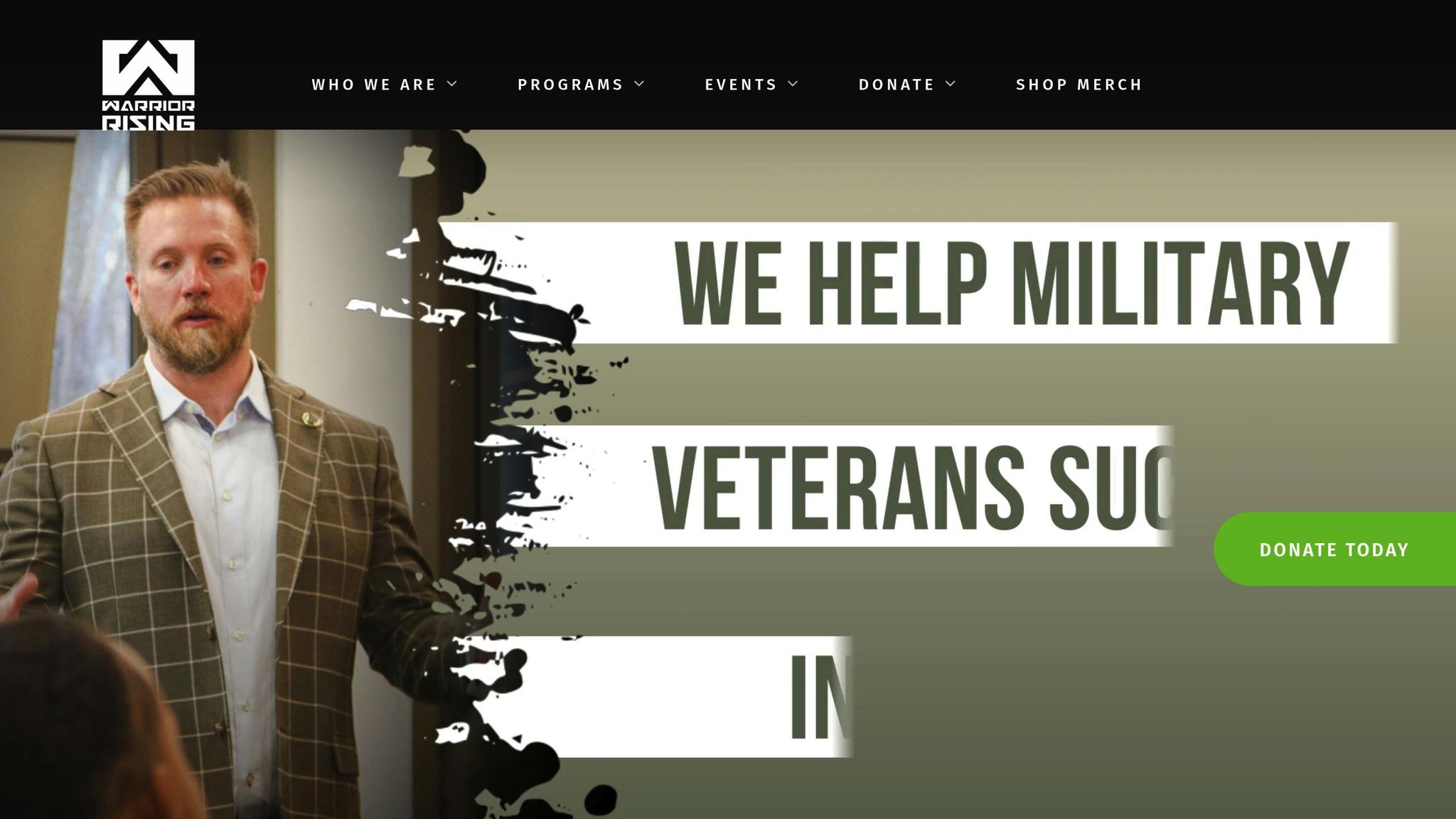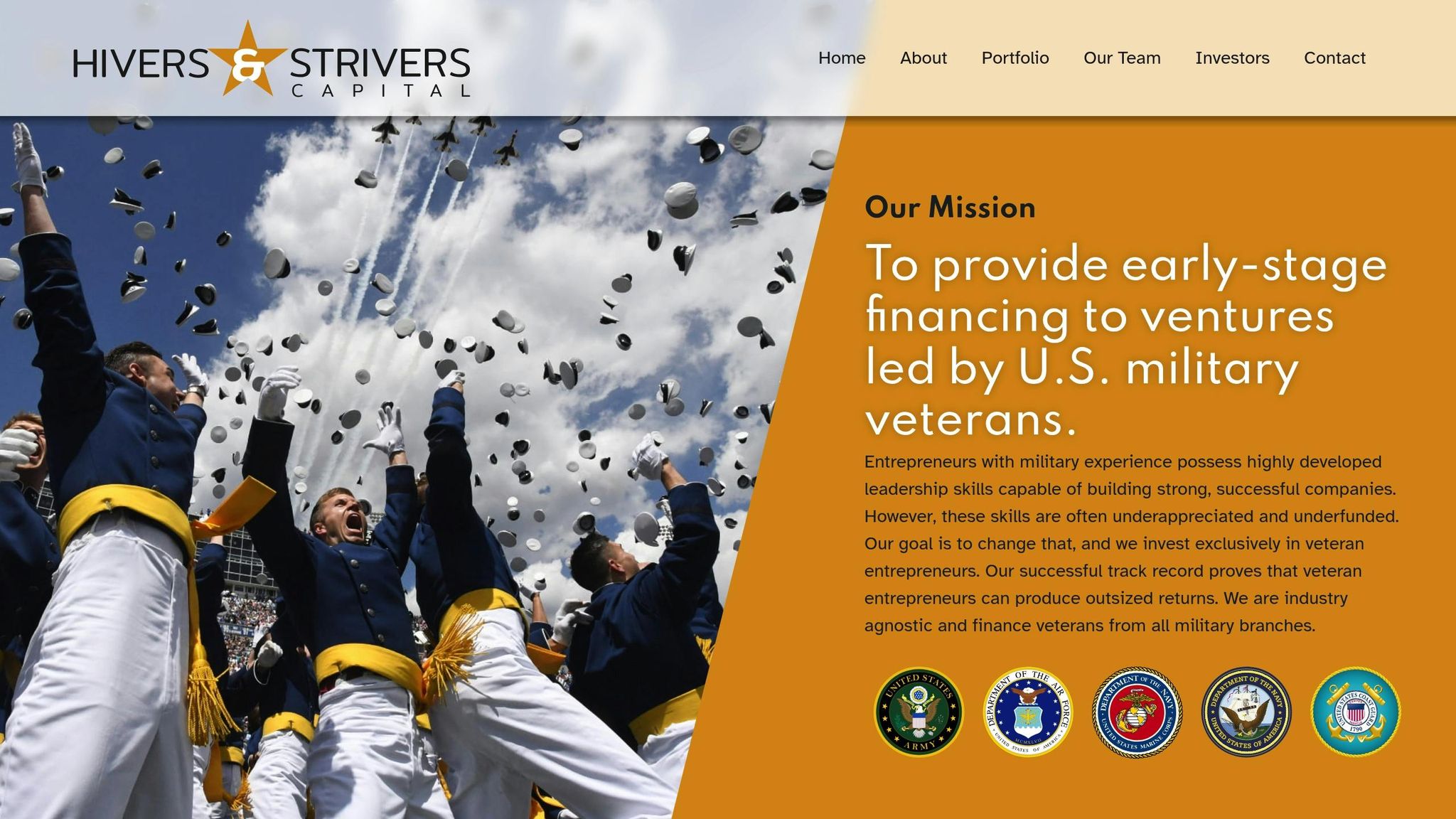Table of Contents
Veteran entrepreneurs often face challenges in securing business funding, but there are several resources available to help. Here's a quick overview of the key funding options and programs:
Federal Programs:
SBA Veteran Advantage Loans: Flexible loans with reduced fees for veterans.
Service-Disabled Veteran-Owned Small Business Program: Federal contracting opportunities for service-disabled veterans.
Military Reservist Economic Injury Disaster Loan (MREIDL): Support for businesses impacted by employee deployment.
Grants:
Second Service Foundation Challenge: Grants up to $15,000 for veteran businesses.
Hiring Our Heroes Grants: $10,000 grants for veteran-owned businesses in economically vulnerable areas.
Warrior Rising Business Program: Training, mentorship, and grant competitions for veterans and military spouses.
Private Funding:
Hivers and Strivers: Investments of $250,000–$1 million for veteran-led startups.
Crowdfunding Platforms: Options like Kickstarter or veteran-focused platforms such as StreetShares.
Application Tips:
Prepare a strong business plan with financial projections and market analysis.
Gather necessary documentation, such as military records and business ownership proof.
Use tools like the SBA’s Lender Match to connect with approved lenders.
Important Deadlines:
SBA VetCert certification is required by December 22, 2024, for federal contracting eligibility.
Hiring Our Heroes grant applications close on February 28, 2025.
Take advantage of these resources to secure funding and grow your business. Start by connecting with a Veterans Business Outreach Center (VBOC) for personalized guidance.
How to Get Business Funding as a Veteran in 2024
Federal Funding Programs
Federal programs offer veteran entrepreneurs access to capital, helping them launch, secure contracts, and grow their businesses.
Service-Disabled Veteran-Owned Small Business Program
The Service-Disabled Veteran-Owned Small Business (SDVOSB) program provides opportunities for veteran-owned small businesses to secure federal contracts. Since January 1, 2023, the certification process for this program has been managed by the Small Business Administration (SBA), transitioning from the Department of Veterans Affairs (VA) [4].
To qualify for SDVOSB certification, businesses must meet the following requirements:
Be at least 51% owned by service-disabled veterans.
Be managed and operated by service-disabled veterans.
Meet the SBA’s size standards for small businesses.
Have the service-disabled veteran status verified by the VA [4].
Important Deadline: Under the National Defense Authorization Act of 2024, all veteran-owned businesses must secure SBA VetCert Program certification by December 22, 2024, to remain eligible for federal subcontracting and related opportunities [4].
SBA Veteran Advantage Loans

The SBA Veteran Advantage program offers multiple loan options with reduced fees and flexible terms tailored to veterans' needs:
Loan Type | Maximum Amount | Key Benefits | Best For |
|---|---|---|---|
SBA Express | $500,000 | No upfront guarantee fees for veterans | Quick funding needs |
SBA 7(a) | $5 million | Longer repayment terms | Established businesses |
Microloan | $50,000 | 6–9% interest rates | Startups |
Community Advantage | $350,000 | Up to 85% SBA guarantee | New businesses in riskier industries |
Veterans must provide military documentation when applying:
Veterans and service-disabled veterans: DD214 forms and any disability-related documentation.
Active-duty personnel: DD2 forms and DD2648.
Military spouses: Proof of marriage and veteran-related documentation [2].
Additionally, the Military Reservist Economic Injury Disaster Loan (MREIDL) program supports businesses impacted when critical employees are called to active duty [6].
To simplify the process, the SBA offers the Lender Match tool, which connects veterans with approved lenders [2].
Preparation Tips: Before applying, gather essential documents, including:
A detailed business plan.
Financial statements.
Tax returns.
Bank statements.
Credit score information [6].
Veterans Business Outreach Centers (VBOCs) are also available to assist with business planning and loan applications [5]. Federal programs play a crucial role in supporting veteran entrepreneurs, but exploring additional funding options, like grants, can further diversify resources. Stay tuned for details on veteran business grants.
Veteran Business Grants
Veterans looking to grow their businesses in 2025 can take advantage of several grant programs designed specifically for them.
Second Service Foundation Challenge

The Military Entrepreneur Challenge (MEC) by Second Service Foundation offers grants between $4,000 and $15,000 to eligible veteran entrepreneurs [8].
Eligibility: Applicants
Stage | Requirements | Details |
|---|---|---|
Registration | Online signup | Participation in Speed Coaching is required |
Initial Phase | Business one-pager | Must use the foundation's template |
Pitch Round 1 | Private presentation | Evaluated by a judging panel |
Final Round | Live audience pitch | Public presentation |
"The MEC was awesome overall, everything from the different mil-adjacent and event-adjacent organizations that were there to lend their services and inform - that was really cool. The competition and everything was just top notch. It was really good, I really enjoyed it."
– Mock Abdelaal, founder of Velos Labs [9]
Next, let’s look at programs that combine training with funding.
Warrior Rising Business Program

Warrior Rising provides a six-step business development program tailored for veterans and military spouses. This program offers training and mentorship while also including a startup grant competition [3].
Key features include:
Personalized coaching
Mentorship opportunities
Networking events
Eligibility for grant competitions
Both new and established businesses are encouraged to apply.
Hiring Our Heroes Grants
The Hiring Our Heroes Small Business Grant Program awards five $10,000 grants to qualifying veteran-owned businesses [7].
Eligibility: Businesses must be at least 51% veteran- or military spouse-owned, have 3–20 employees, generate less than $5 million in revenue, and operate in one of the 48 contiguous states, Alaska, or Hawaii in an economically vulnerable area.
Application Deadline: February 28, 2025 [7].
"Hiring Our Heroes' Small Business Grant Program will honor the achievements of veteran- and military spouse-owned small businesses, highlighting their impact and contributions to local communities and America's economic growth."
– Hiring Our Heroes [7]
Additional grant options include the Stephen L. Tadlock Veteran Grant ($1,000 for 25 businesses) and the Texas Woman's University Veteran Woman Entrepreneur Grant ($5,000 for women veterans) [8]. These grants often have less competition and provide targeted support.
With veteran-owned businesses employing 5.8 million people [10], these grants, along with federal loans and private funding options, create a solid foundation for veteran entrepreneurs looking to expand their ventures.
Private Funding Options
Veteran entrepreneurs seeking larger amounts of capital can turn to private funding for financial support, expertise, and valuable connections. After exploring federal and grant options, private funding provides another way to secure business growth resources.
Hivers and Strivers Investment Group

Hivers and Strivers focuses on supporting businesses led by graduates of U.S. service academies. Since 2009, they’ve invested in over 20 veteran-led companies, typically offering funding amounts between $250,000 and $1 million per round [11][12].
The group boasts a robust advisor network, which includes former Amazon executives and the Army's Surgeon General.
Investment Criteria | Details |
|---|---|
Minimum Investment | $250,000 |
Maximum Investment | $1,000,000 |
Business Stage | Early-stage ventures |
Ownership Requirement | Must be veteran-led |
Application Process | Online "Pitch Us" form |
"To provide early-stage financing to ventures led by U.S. military veterans." - Hivers and Strivers [11]
Hivers and Strivers, along with the Veteran Fund, both offer investment ranges of $250,000 to $1 million. The Veteran Fund, however, emphasizes businesses in dual-use and critical technology sectors [13].
For those seeking alternatives to direct investment, crowdfunding offers a community-driven way to raise funds.
Crowdfunding for Veterans
Crowdfunding allows veteran entrepreneurs to gather capital while fostering a supportive community around their business. This approach works particularly well for product launches and small-scale ventures [14].
Choosing the Right Crowdfunding Platform:
Type | Best For | Popular Platforms |
|---|---|---|
Reward-Based | Product launches, creative projects | Kickstarter, Indiegogo |
Equity-Based | Scalable businesses | |
Veteran-Focused | Military community support | StreetShares, Localvest |
To succeed with crowdfunding, tap into your military network, keep backers updated regularly, and fulfill your commitments to build trust [14].
"Military vets are an exceptional, underappreciated and underfunded talent pool of entrepreneurial leaders. In early-stage investing, we bet on the jockey, not the horse and with the skills acquired during active duty, we believe companies led by former leaders of our armed forces are more likely to succeed." - Hivers and Strivers [15]
For example, alumni of the DAV Patriot Boot Camp have collectively raised $200 million in venture capital [1]. This highlights the strong potential for veterans to thrive in the private funding landscape, complementing the other funding strategies available to them.
Application Success Tips
Securing funding starts with creating an application that stands out. Once you've identified the best funding sources, focus on crafting an application that highlights your business's strengths and potential. Here's how to make your application shine.
Writing Your Business Plan
Your business plan is your chance to showcase both your military background and business expertise. Highlight your strengths by including these key elements:
Essential Business Plan Components | Key Elements to Include |
|---|---|
Executive Summary | Mission statement, business concept, funding needs |
Market Analysis | Target market size, competitor research, industry trends |
Financial Projections | 3-5 year forecasts, cash flow statements, break-even analysis |
Military Advantage | Leadership skills, relevant training, security clearances |
"When it comes to securing funding for your business, a well-written business plan plays a pivotal role." - The Funding Family [16]
Set clear, measurable goals (SMART goals) and explain how your military experience positions you to achieve them. With your plan ready, gather the necessary documents to support your strategy.
Required Documents
If you're applying through the SBA's VetCert program, you'll need specific documents to verify your veteran status and business ownership. Organizing these early can save time and reduce stress:
Document Category | Required Items |
|---|---|
Veteran Status | DD-214, VA disability rating letter |
Business Formation | Articles of incorporation, operating agreement |
Ownership Proof | Stock certificates, membership certificates |
Financial Records | Tax returns, financial statements, bank statements |
The MySBA Certifications portal offers detailed checklists and pre-application guides to help you stay on track.
Creating Your Pitch
Your pitch should emphasize market needs, your unique military advantage, and results backed by data. Focus on these core components to make your presentation compelling:
Pitch Component | Focus Areas |
|---|---|
Problem Statement | Market pain points and size of opportunity |
Solution | Your unique approach and competitive advantages |
Traction | Current progress, partnerships, early wins |
Team | Military background and relevant expertise |
Financial Ask | Specific funding needs and planned use of funds |
Keep your pitch clear and focused. Use data to connect financial projections to market opportunities. Address potential concerns with concise, evidence-based responses [17]. A well-prepared pitch can make all the difference.
Next Steps
Now that you’re familiar with the funding resources, it’s time to take action and secure the funds you need. Reach out to Veteran Business Outreach Centers (VBOCs) for personalized guidance, mentorship, and training throughout the process.
Priority Action | Key Resource |
|---|---|
Initial Training | Boots to Business Program |
Business Planning | VBOC Workshops |
Certification | Apply for SBA VetCert via MySBA Certifications |
Funding Assistance | SBA Lender Match Tool |
The federal government sets aside at least 5% of all contracting dollars for service-disabled veteran-owned businesses [4]. This makes the VetCert certification a powerful tool for accessing these opportunities.
Here’s how to get started:
Connect with your local VBOC: They’ll provide tailored advice to help you along your journey.
Enroll in the Boots to Business program: This training is specifically designed to help veterans transition into entrepreneurship.
Register on MySBA Certifications: Begin your VetCert application to unlock contracting opportunities.
Use the SBA’s Lender Match tool: This tool connects you with approved lenders who can help fund your business.
Additionally, service-disabled veterans should consider joining the Service-Disabled Veteran Entrepreneurship Training Program (SDVETP), while women veterans can benefit from the Women Veteran Entrepreneurship Training Program (WVETP) [5].
The SBA's Office of Veterans Business Development (OVBD) offers a range of services, including training, counseling, and education, all tailored to help veterans successfully navigate the funding process [18].
Take advantage of your leadership skills and work through these steps one at a time to secure the resources you need.
FAQs
What are the requirements to qualify for the Service-Disabled Veteran-Owned Small Business (SDVOSB) Program, and how do I apply?
To qualify for the Service-Disabled Veteran-Owned Small Business (SDVOSB) Program, your business must meet these key requirements:
It must be classified as a small business under the NAICS code relevant to the contract.
At least 51% of the business must be unconditionally and directly owned by one or more service-disabled veterans.
Daily operations and decision-making must be controlled by one or more service-disabled veterans. If the veteran has a permanent and severe disability, their spouse or permanent caregiver may manage the business.
To apply, you’ll need to complete the certification process through the MySBA Certifications portal. This will involve verifying your eligibility and providing required documentation. Once certified, your business can access exclusive contracting opportunities and resources designed to support veteran entrepreneurs.
What steps can veteran entrepreneurs take to create a strong business plan and improve their chances of securing funding?
To boost their chances of securing funding, veteran entrepreneurs should focus on crafting a clear and comprehensive business plan. A strong plan not only communicates your vision to lenders and investors but also serves as a roadmap for your business's growth.
Your business plan should include key elements such as:
Executive Summary: A brief overview of your business idea, goals, funding needs, and projected costs.
Market Research: Insights into your target audience, competitors, and market size.
Financial Projections: Income statements, cash flow forecasts, and balance sheets to demonstrate financial viability.
Marketing and Sales Strategies: Plans to promote your product or service and attract customers.
By presenting a well-organized and realistic plan, you can build confidence with potential funders and set your business up for long-term success.
What are the advantages of crowdfunding for veteran-owned businesses, and how can veterans use their military network to succeed?
Crowdfunding can be a powerful tool for veteran-owned businesses, offering benefits like access to a broad audience of potential backers, opportunities to validate your business idea, and increased visibility for your brand. It also helps create a sense of community and support around your product or service.
Veterans can leverage their military experience by showcasing skills such as leadership, teamwork, and resilience, which resonate with potential supporters. Additionally, tapping into veteran-focused communities and networks can amplify your campaign, as many people are eager to support businesses led by those who have served. Highlighting your unique story and mission can also help build trust and connection with your audience.

